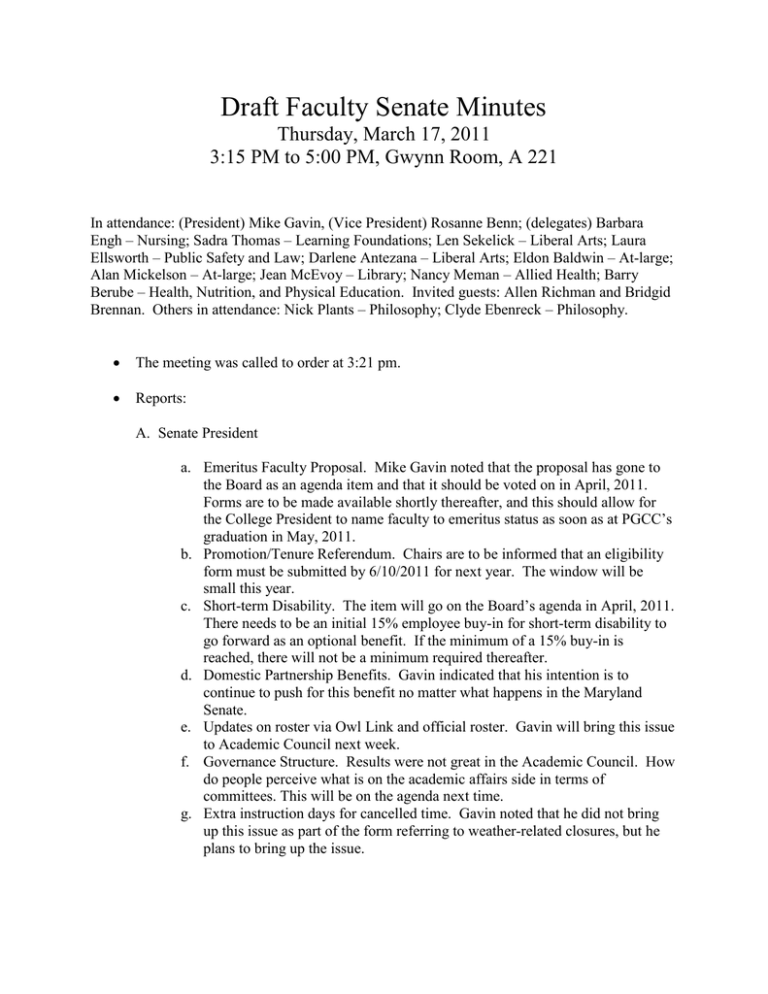Draft Faculty Senate Minutes Thursday, March 17, 2011
advertisement

Draft Faculty Senate Minutes Thursday, March 17, 2011 3:15 PM to 5:00 PM, Gwynn Room, A 221 In attendance: (President) Mike Gavin, (Vice President) Rosanne Benn; (delegates) Barbara Engh – Nursing; Sadra Thomas – Learning Foundations; Len Sekelick – Liberal Arts; Laura Ellsworth – Public Safety and Law; Darlene Antezana – Liberal Arts; Eldon Baldwin – At-large; Alan Mickelson – At-large; Jean McEvoy – Library; Nancy Meman – Allied Health; Barry Berube – Health, Nutrition, and Physical Education. Invited guests: Allen Richman and Bridgid Brennan. Others in attendance: Nick Plants – Philosophy; Clyde Ebenreck – Philosophy. The meeting was called to order at 3:21 pm. Reports: A. Senate President a. Emeritus Faculty Proposal. Mike Gavin noted that the proposal has gone to the Board as an agenda item and that it should be voted on in April, 2011. Forms are to be made available shortly thereafter, and this should allow for the College President to name faculty to emeritus status as soon as at PGCC’s graduation in May, 2011. b. Promotion/Tenure Referendum. Chairs are to be informed that an eligibility form must be submitted by 6/10/2011 for next year. The window will be small this year. c. Short-term Disability. The item will go on the Board’s agenda in April, 2011. There needs to be an initial 15% employee buy-in for short-term disability to go forward as an optional benefit. If the minimum of a 15% buy-in is reached, there will not be a minimum required thereafter. d. Domestic Partnership Benefits. Gavin indicated that his intention is to continue to push for this benefit no matter what happens in the Maryland Senate. e. Updates on roster via Owl Link and official roster. Gavin will bring this issue to Academic Council next week. f. Governance Structure. Results were not great in the Academic Council. How do people perceive what is on the academic affairs side in terms of committees. This will be on the agenda next time. g. Extra instruction days for cancelled time. Gavin noted that he did not bring up this issue as part of the form referring to weather-related closures, but he plans to bring up the issue. Academic Affairs Assessment System Allen Richman spoke with the Faculty Senate on the process of creating an assessment system at Prince George’s Community College. Core Learning Outcomes need to be measured, as well as program outcomes and course outcomes. The final piece is to show improvement in areas where students are struggling. This is a cycle of assessing data, analyzing it, intervention, and then re-analysis. Richman talked about a timeline of three to five years for this circular assessment to take place, at which point the process would begin anew. Richman noted that there is a call for larger segments of students to be evaluated and that there needs to be a range of considerations taken into account, such as enlisting the participation of full-time and adjunct instructors. The interest is to combine the evaluation of outcomes to move students through to improvement. Assessment will be unified under one house rather than being segmented across campus as a way to add to uniformity. A DAT (Department Assessment Team), a team of faculty, will be charged with overseeing the process for a given department to make sure that necessary steps are taken in order to move forward. This is a campus-wide initiative. A committee will be selected to choose the software to find what will meet our needs and to connect this to what we need in the classroom. Rosanne Benn asked what this software will cost and whether it will do what we need, something that she noted did not work out so well with Colleague. Richman indicated that the emphasis will be on what software best meets our needs and that the user-friendliness and compatibility with BlackBoard or whatever software is chosen will be the main considerations. Richman suggested that this will not be as cumbersome as Colleague and pointed out that most campuses are running several systems. Richman indicated that at this point we do not have specific details on cost, and he likened the software-selection process to negotiations with a car dealer. Clyde Ebenreck asked whether an individual student will be assessed through the system. Richman answered that this is potentially the case, perhaps for one assignment per quarter. Richman noted that besides the cumulative grade, some inclusion of an additional assessment would be necessary. Also, considering that many students come and go at the College, assessing a single student’s performance across semesters is admittedly difficult to do systematically. Courses with multiple sections could be assessed, perhaps at a percentage representing 40 – 60%. What an adequate assessment percentage would be has not been answered, but having only a few examples will not be considered sufficient. Richman indicated that age, race, campus, and other differences are things that need to be taken into consideration in order show progress. Clyde Ebenreck asked about the possibility of using entrance exams across the board as a baseline measurement. Richman said that the committee was open to a range of suggestions. Referring to Ebenreck’s field, philosophy, Richman spoke about the possibility of being able to see the impact of having students who have taken a certain class such as Philosophy 1010 on students’ improvement following completion of the course. Gavin asked about how to choose courses to be assessed, and Richman answered that large enrollment classes are the ones that would be targeted for assessment. Richman noted that programmatic outcomes would enter into the process as demonstrated by what a given department believes to be the best evidence of programmatic outcomes. Richman noted that 80% of the students at PGCC are in 20% of the classes. By measuring what is going on in the 20% of classes referred to here, we can see what is going on with students in the aggregate or within some subset of the student body. Using courses with lots of students and many sections makes it easier to sample with more students and analyze the outcomes. Benn commented that this sounds a bit abstract and asked what is involved in all of this. Richman replied that it comes down to compiling and running data and emphasized that assessment is “our business” as an educational institution. It is necessary for whatever is being done in given departments to be shared and brought forward. We have to demonstrate that students are meeting programmatic outcomes. What this plan does is to align work that is being done. Bridget Brennan made reference to the assessment system document that addresses what will need to be done and how the shepherding will take place. At some point in the future, departments will meet to determine how to come up with rubrics and measure what will be going on. Ebenreck noted that there are those at the College who have trouble getting grades turned in on time; he wondered how time-consuming this process could end up being. Richman addressed this concern by clarifying that the specific work required would be the choosing of an assignment or two, administering it/them, and grading the assignment(s). Richman says that information would be gathered from a rubric-based assessment instrument. Richman said that the timeline will be three or four years and that part of this process will involve learning how data can best be entered into the system. Richman underscored that we have to have the data and then find the best way to measure the data. Ebenreck noted that adjuncts who are already overworked will find this process quite cumbersome. Richman noted that letter grades no longer hold water and that rubricbased assessment has become standard practice around the State of Maryland since 2005. Gavin echoed Ebenreck’s concerns and noted that we do not have a system in place that allows for adjunct inclusion because adequate infrastructure is not in place to foster such inclusion. Richman pointed out that inter-instructor pass rates differ and that it is necessary to create more consistency between instructors and between full-time and adjunct faculty. Nick Plants noted that a multiple-choice-type test is easy to assess, but other courses do not offer the same kind of ready-made results. Plants went on to note that many of his students in a general education course have more in common with developmental students in that they have not jumped over certain hurdles in their educational process in ways that other students in certain programs at PGCC are more likely to have had to do. Richman noted that the learning outcomes are what will be addressed through assessment, while he conceded that the range of students is something that is different from one course to another. Richman also pointed out that the sequencing of courses and the ordering of courses in different disciplines have an impact on a student’s success. The assessment system is about finding ways to improve our practices and the ways we address information. Plants asked for there to be flexibility in the process and noted that in some disciplines there is no common assignment. Brennan commented that the assignment does not have to be a common one, but the rubric would have to be uniform. Plants noted that pedagogy should drive assessment, not the other way around. Richman commented that they should work hand in hand. Plants pointed out that he views the document as one that aligns more easily with certain programs at the College and perhaps less well with the broad population in general education. Brennan commented that the department DAT will get the results back. Eldon Baldwin asked about how quality control would work. Baldwin noted that there is a great deal of discrepancy between how one instructor grades compared with other instructors who teach the same material/same course, even when a given assignment or test instrument is the same. Richman noted that finding consistency between right and wrong answers will be something that will need tweaking and will have to be worked out in the rubrics. Baldwin noted that how quality control is to happen and how it will be negotiated, integrated, and implemented within the culture of the College is something that has never been addressed and that there has never been a face-to-face discussion of how this is to be put into practice. Richman noted that this process is not intended to be punitive and referred to improving conditions as the intended goal. Richman admitted that the shift in culture will not be an easy one. Richman emphasized that outcomes are a key point and that they are what we are guaranteeing our students. Richman commented that the only way to improve this is to move forward with an assessment system. Richman and Brennan noted that the document is not a final product but rather a work in progress that will require more planning and input. Richman indicated that ultimately we are moving towards a rubrics-based assessment. Baldwin noted that departments have made an effort to limit the number of course outcomes. Richman replied that reducing outcomes is about defining what the parameters of a course are and identifying key components. The boundaries of the class need to be defined; we do not need to reduce what we are teaching. The level of specificity, where the number of items is smaller for outcomes, allows for a holistic view. Brennan commented that we will learn a lot from the piloting experience. Barbara Engh commented that she has been at College for 17 years and that the evidencebased fields at the College such as nursing are outcomes-based. The outcomes have to drive the rubric. Assessment needs to be a part of this process. Richman spoke of the flash-in-the-pan concerns that occasionally crop up. Since this became part of Middle States in 2002, all we have seen is an increase in the use of assessment with a rubrics-based yardstick. Accountability is a key component of this process, and proving that we are able to meet these assessment goals will remain necessary in the future in terms of meeting Middle States’ requirements as well. Ebenreck suggested that having faculty buy into this could come from sharing how students have fared from one semester to the next; he noted that we have been asked to create assessment tools at different junctures in the past without little or no feedback. Richman said that providing the sort of feedback Ebenreck is suggesting would be possible with a large enough sample. Richman added that the data will come back to the faculty unlike in some other cycles in which there has not necessarily been feedback. Ebenreck noted that faculty members need to see something along the lines of feedback in order to create enthusiasm. Baldwin commented that individual faculty members never get feedback on how students do in subsequent courses. Baldwin added that he sees very clear patterns when he looks at his students’ information. Plants suggested that a chance to see the outcomes from data gathered in January, 2011 would be of value. Richman noted that these data are being entered at present, but he noted that a grade of A, B, C, D, or F does not tell us the real story. The percentage of adjuncts has gone up in recent years since the number of students has increased. Following students’ performance across disciplines and looking at some particular skill like critical thinking is difficult to measure. Jumping through hoops is not the same as being engaged. Baldwin indicated that he views it as very challenging to involve adjuncts in implementing this sort of assessment. Baldwin also noted that full-time faculty will likely have to take on assessment tasks related to adjuncts’ courses in order to include a sufficient portion of courses taught by adjuncts in a large-scale assessment system across the College. Alan Mickelson pointed out that there is a systemic lack of inclusion for adjuncts at the College. Rosanne Benn adjourned the meeting at 5:03 pm.



